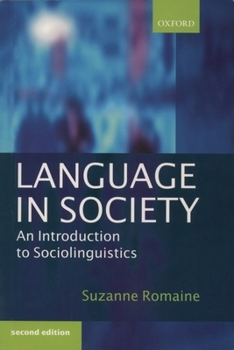Language in Society: An Introduction to Sociolinguistics
Select Format
Select Condition 
Book Overview
Why have 1500 separate languages developed in the Pacific region? Why do Danes understand Norwegians better than Norwegians understand Danish? Is Ebonics a language or a dialect? Linguistics tends to ignore the relationship between languages and the societies in which they are spoken, while sociology generally overlooks the role of language in the constitution of society. In this book Suzanne Romaine provides a clear, lively, and accessible introduction to the field of
sociolinguistics and emphasizes the constant interaction between society and language. She shows how our linguistic choices are motivated by social factors, and how certain ways of speaking come to be vested with symbolic value, drawing from evidence from studies of cultures and languages all over
the world. This new edition incorporates new material on current issues in the study of gender as well as other topics such as the linguistic dimension to the ethnic conflict in the Balkans, and the controversy over Ebonics in the United States.
sociolinguistics and emphasizes the constant interaction between society and language. She shows how our linguistic choices are motivated by social factors, and how certain ways of speaking come to be vested with symbolic value, drawing from evidence from studies of cultures and languages all over
the world. This new edition incorporates new material on current issues in the study of gender as well as other topics such as the linguistic dimension to the ethnic conflict in the Balkans, and the controversy over Ebonics in the United States.
Format:Paperback
Language:English
ISBN:0198731922
ISBN13:9780198731924
Release Date:January 2001
Publisher:Oxford University Press, USA
Length:280 Pages
Weight:0.90 lbs.
Dimensions:0.6" x 6.3" x 9.2"
Customer Reviews
5 ratings
A good Introduction
Published by Thriftbooks.com User , 19 years ago
Suzanne Romaine takes the reader on a whirlwind tour of the field of sociolinguistics. The role of society in language use is examined from many different angles. Since this is an introductory book, it doesn't go into each subfield very deeply, but it does give you a broad overview of what we study in this field. I thought that the author paid particular attention to the issues of pidgins and creoles, and gender issues in language use. This would be useful for beginners in sociolinguistics and for those interested in the two specializations mentioned above.
Interesting thoughts by Suzanne herself
Published by Thriftbooks.com User , 19 years ago
Though it is difficult to define the field of sociolinguistics, the author succeeds to resume the complicated topics. Professior Ossan recommended it in favor of the sophistication and the usefulness. G-head, a friend of mine, said to me "The sentence structures in this book are a little bit difficult to non-native speaker", which I can agree. His opinion probably hints this book is suggestive in terms of not just its contents but also its readability.
Very accessible and concise
Published by Thriftbooks.com User , 20 years ago
This was my first "read" in the area of sociolinguistic, though after working my way through texts in other linguistic areas I can say that this was the most enjoyable and understandable of the lot. Plenty of great examples provided, and the chapter on language and gender particulary compelling. It's good enough to make you want to take up sociolinguistics as a career.
A good introduction
Published by Thriftbooks.com User , 24 years ago
This is a concise book on sociolinguistics. It does not dwell excessively on methodology or theoretical perspectives but offers through many examples, some presented via tables and figures, a taste of the kinds of issues sociolinguists struggle with, as well as some of their major findings. As a specialist in the Papua New Ginean languages, Romaine naturally makes good use of non-Western examples like Tok Pisin to illustrate such problems as language/dialect, language contact, language hierarchy, though she also draws examples from the Scandanavian languages as well as research on the social dialects of English. The book is highly readable even to a non-linguist like me. It probably does not cover all the conceivable major topics, but what it covers it covers well. The annotated bibliography at the end of each chapter is a useful guide to further reading.My only complaint regards her non-critical citation of the much-repeated "fact" (to illustrate the language/dialect problem) that speakers of mutually unintelligible Chinese languages share a common writing system. This of course is true only for the classical literary (written) language, not the vernacular varieties.
Read this before any other book on Sociolinguistics
Published by Thriftbooks.com User , 24 years ago
This is the book you should read first if you have even a slight interest in Sociolinguistics, the branch of linguistics dealing with how society uses language. My particular area of interest is code-switching (when a person switches from one language to another within an exchange, i.e. "Have agua, please?") and I read Dr. Romaine's book to prepare me for a volume particulary about code-switching. Thanks to Dr. Romaine for a great read.






